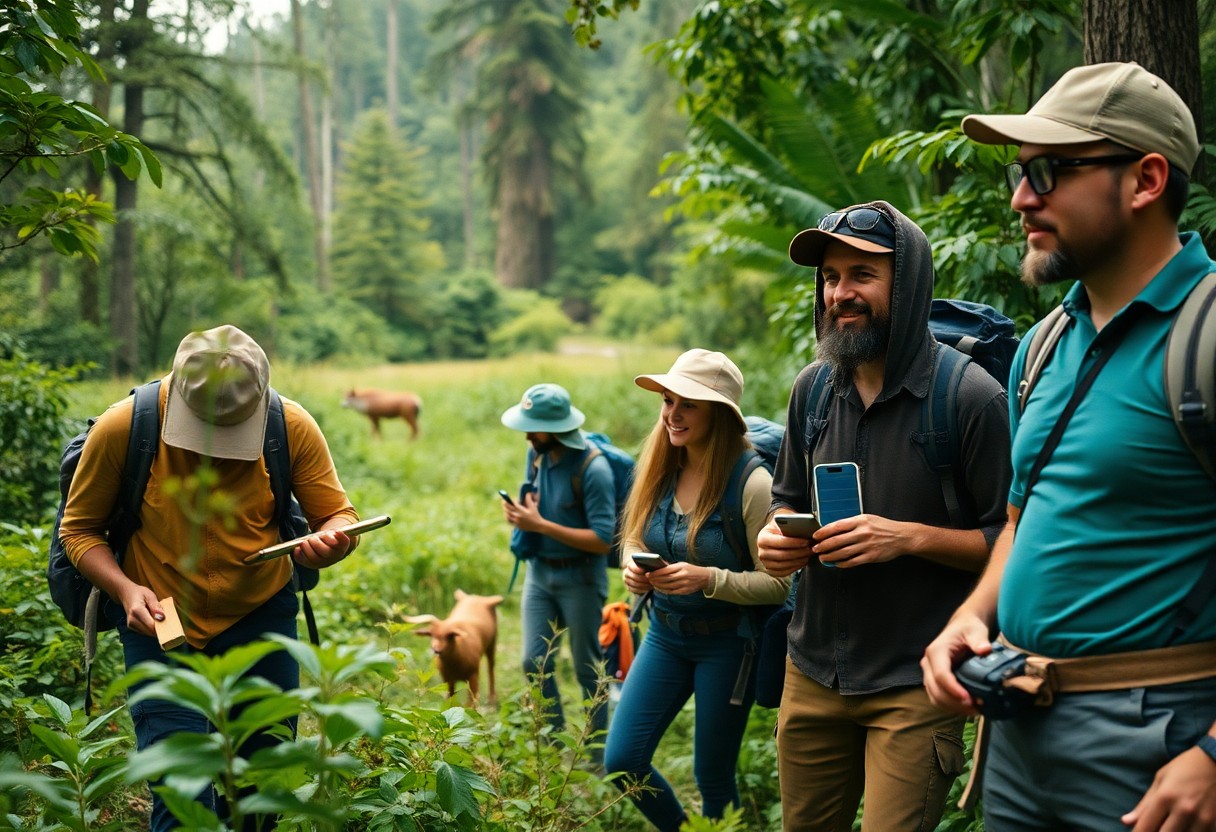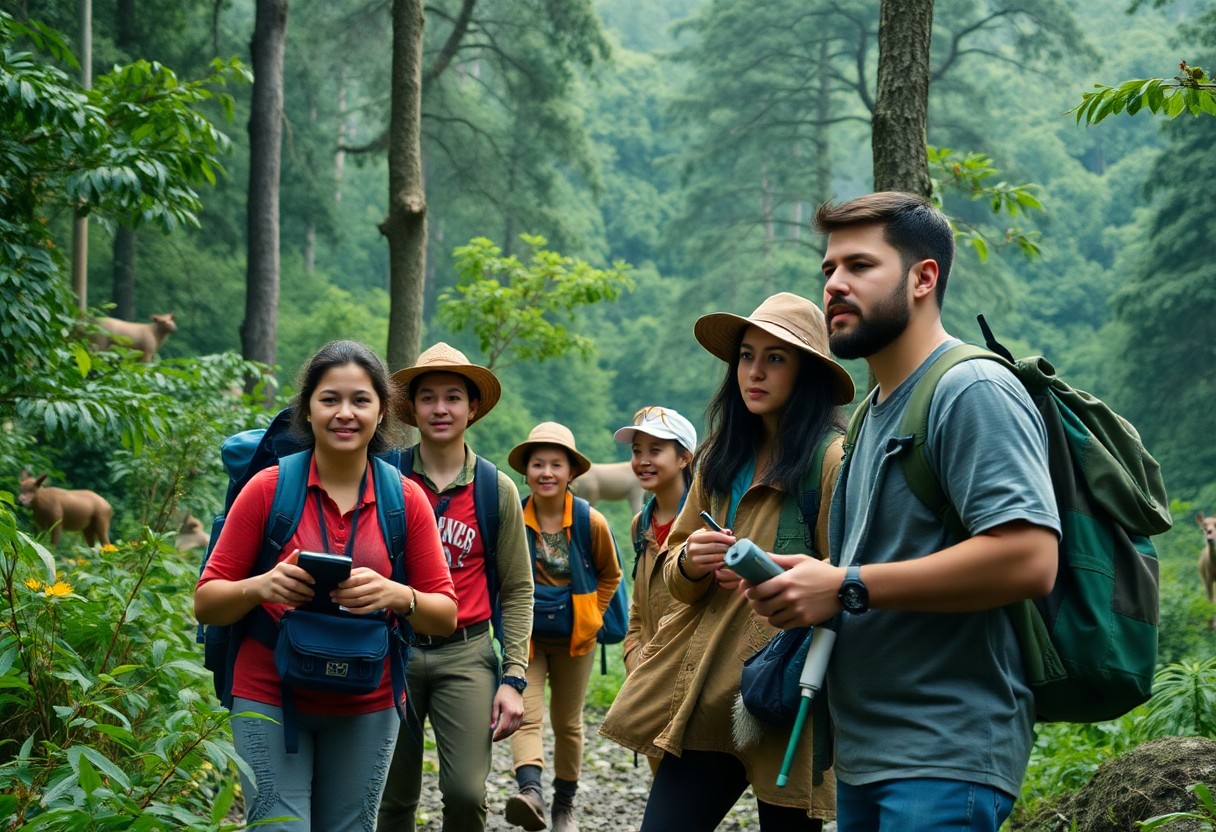
This guide will empower you to explore our planet while minimizing your environmental impact with these sustainable adventures. As you commence on your journeys, you’ll discover practical tips on eco-friendly travel choices, such as sustainable transportation, responsible wildlife tourism, and ethical accommodations. By adopting these practices, you can enjoy enriching experiences that not only satisfy your wanderlust but also protect the beautiful locations you visit. Join us in making a positive difference, one adventure at a time.
Key Takeaways:
- Opt for eco-friendly transportation such as biking, walking, or using public transport to reduce carbon emissions while exploring new places.
- Support local economies by choosing to stay in locally-owned accommodations and dining at restaurants that prioritize sustainable practices.
- Engage in wildlife tourism responsibly by observing animals in their natural habitats rather than participating in activities that exploit or harm them.
- Participate in conservation efforts or volunteer opportunities during your travels to actively contribute to the sustainability of the areas you visit.
- Practice minimal waste by bringing reusable items, such as water bottles and shopping bags, to limit the environmental impact of your journey.
Sustainable Adventures – How to See the World Without Harming It
| Aspect | Sustainable Practice/Tip | Example or Details | Source |
|---|---|---|---|
| Destination Choice | Choose eco-friendly locations and operators committed to sustainability | Destinations like Spain, Patagonia, or the Galápagos; operators supporting conservation and local communities | 125 |
| Transportation | Use low-carbon options: trains, buses, direct flights, public transit, cycling | Take the train instead of flying, use local transit, rent bikes, choose direct flights to cut emissions | 2357 |
| Accommodation | Stay in eco-lodges, green-certified hotels, or places using renewable energy | Solar-powered camps, hotels with rainwater harvesting, locally sourced materials and food | 147 |
| Supporting Locals | Eat at local restaurants, buy from artisans, hire local guides | Farm-to-table dining, community-based tours, locally sourced souvenirs | 127 |
| Eco-Friendly Activities | Choose low-impact adventures: hiking, cycling, wildlife watching, voluntourism | Trekking in nature reserves, ethical wildlife tours, participating in conservation or clean-up projects | 17 |
| Waste Reduction | Avoid single-use plastics, pack light, use reusable items | Bring reusable bottles, compost waste, recycle, pack lighter to reduce fuel use | 1237 |
| Conservation Support | Participate in or fund conservation efforts, carbon offset programs | Tree planting with organizations, supporting wildlife reserves, offsetting travel emissions | 167 |
| Education & Respect | Learn about and respect local cultures and ecosystems | Follow local customs, attend conservation talks, avoid disturbing wildlife | 27 |
| Small Group Travel | Travel in small groups to minimize impact | Smaller tours reduce environmental footprint and allow for immersive, responsible experiences | 1 |
| Eco-Friendly Gear | Use sustainable products: solar chargers, biodegradable toiletries, recycled luggage | Solar chargers, soap bars, refillable containers, bags made from recycled materials | 7 |
Key Principles of Sustainable Adventure
-
Minimize Environmental Impact: Opt for renewable energy, reduce waste, and use sustainable transport1247.
-
Support Conservation: Choose operators and activities that directly contribute to protecting nature and wildlife167.
-
Empower Local Communities: Spend locally and respect traditions, ensuring tourism benefits residents127.
-
Educate and Engage: Learn about the places you visit, participate in conservation, and share knowledge about sustainability127.
By following these practices, travelers can enjoy the thrill of adventure while ensuring the world’s wild places and cultures remain vibrant for generations to come1711.
Redefining Travel: The Principles of Sustainable Tourism
Sustainable tourism challenges the traditional notions of travel by prioritizing environmental protection, cultural respect, and social equity. This means embracing practices that minimize negative impacts on ecosystems while enhancing the experiences of local communities. By choosing to travel more mindfully, you are part of a movement that advocates for not just being a visitor, but a responsible global citizen who contributes positively to every destination explored.
Understanding Your Travel Footprint
Your travel footprint encompasses all the environmental impacts associated with your journey, from carbon emissions produced during flights to the resources consumed while staying in accommodations. By assessing your footprint, you gain insight into how your travel choices affect the planet, allowing you to identify areas where you can reduce your impact and make more sustainable decisions.
The Benefits of Sustainable Choices
Opting for sustainable travel choices yields far-reaching benefits—for both you and the communities you visit. By prioritizing local businesses, using eco-friendly accommodations, and engaging in responsible tourism practices, you help foster economic growth, preserve cultural heritage, and protect natural landscapes. Your choices can create a ripple effect, inspiring others to adopt more sustainable habits and ensuring that destinations remain vibrant and intact for future generations.
Supporting local economies is a particularly significant benefit of sustainable choices; studies show that when travelers choose local guides or eat at family-owned restaurants, over 80% of that money stays within the community. This not only bolsters livelihoods but also fortifies cultural pride and resilience. Meanwhile, minimizing reliance on non-renewable resources helps combat climate change, conserving biodiversity and protecting fragile ecosystems. When you engage in sustainable practices, you become part of a larger solution, demonstrating that exploration can coexist harmoniously with ecological stewardship.
Crafting Your Itinerary: Destination Selection and Transportation
Choosing Eco-Friendly Destinations
Your choice of destination can significantly impact the environment. Prioritize locations committed to sustainability, like Costa Rica—known for its extensive national parks and biodiversity—or cities with robust green initiatives, such as Copenhagen or Amsterdam. Research certifications like EarthCheck or Green Key, which identify eco-friendly lodgings and attractions. By selecting destinations with eco-conscious practices, your adventures contribute to local economies while preserving cultural and natural heritage.
Sustainable Transportation Options
Utilizing sustainable transportation sources diminishes your travel footprint. Opt for trains, buses, or bicycles to explore areas authentically and reduce reliance on fossil fuels. Electric vehicles and carpooling also present smarter alternatives to single-occupancy rides, especially in urban environments. For longer journeys, consider airlines with carbon offset programs, which invest in renewable energy projects to balance out emissions.
When planning your journey, integrating sustainable transportation options can transform your exploration into an eco-friendly experience. For instance, trains emit up to 80% less carbon per passenger than cars and airplanes, making them a greener choice for intercity travel. Many destinations also offer bike-sharing programs or designated lanes for cycles, encouraging you to navigate cities while minimizing your carbon footprint. Research the availability of electric vehicle charging stations or public transportation systems to maximize convenience and sustainability, effectively allowing you to traverse stunning landscapes with care for the environment.
Accommodations that Care: Resorts, Hotels, and Alternatives
Choosing accommodations that prioritize sustainability can enhance your travel experience while also protecting the planet. Look for hotels and resorts that implement eco-friendly practices, such as energy-efficient lighting, water conservation measures, and waste reduction initiatives. Some options may include eco-lodges that use sustainable materials and support local wildlife conservation. For more insights, check out Eco-Adventures: How Tourism Businesses Can Embrace … this remarkable movement.
Identifying Green Accommodations
Identify green accommodations by researching certifications, such as LEED (Leadership in Energy and Environmental Design) or Green Key. These credentials indicate that a property meets established environmental standards. Investigate reviews and testimonials to gauge experiences from fellow travelers who value sustainability. Look for hotels that prioritize local sourcing for food and materials, creating a vibrant environmental footprint.
Supporting Local Economies and Ecotourism
Your choice of accommodation can have a direct impact on local economies and the growth of ecotourism. By selecting locally-owned accommodations or those that contribute to community development, you are investing in the well-being of the destination you visit. Such establishments often employ local residents, promote local culture, and encourage the use of nearby resources, which helps create jobs and sustain a thriving economy.
Supporting local economies not only enhances your travel experience but also fosters community resilience. When you choose accommodations that emphasize ecotourism, you’re ensuring that the benefits of your stay are distributed throughout the community. For example, eco-lodges often partner with local artisans and farmers, providing a platform for their work. This encourages the preservation of traditional practices and ensures economic stability while promoting responsible tourism practices. Ultimately, your travels can contribute to a sustainable future for destinations you cherish.
Experiences that Benefit: Engaging with Local Cultures
Your travel journey becomes more meaningful when you engage deeply with local cultures, creating lasting memories and direct economic benefits for the communities you visit. Authentic experiences such as home-stays, cultural workshops, or guided tours led by locals not only enrich your understanding of the destination but also help preserve its traditions and practices. By participating in these genuine interactions, you support the livelihood of local artisans and community members, making your travel experience a two-way street that fosters cultural exchange and understanding.
The Value of Community-Based Tourism
Community-based tourism offers a unique opportunity for you to connect with local populations in a respectful and mutually beneficial way. This approach allows communities to showcase their culture, food, and traditions while providing travelers with authentic experiences. By opting for such tourism practices, you contribute directly to local economies, ensuring that the benefits of tourism are distributed fairly among residents and helping to sustain their way of life.
Participating in Conservation Efforts
Engaging in conservation efforts during your travels strengthens the bond you create with the environment while helping protect vulnerable ecosystems. Numerous organizations offer programs that invite travelers to participate in hands-on conservation work, from tree planting to wildlife monitoring. These immersive experiences not only allow you to contribute to vital conservation efforts but also provide educational opportunities that deepen your appreciation for the natural world.
For instance, volunteering with a marine conservation project in Costa Rica might involve research on sea turtle nesting sites, directly helping protect these endangered species. In that process, you learn the challenges they face, from poaching to habitat destruction, and gain insights into local efforts to mitigate these threats. Whether it’s restoring coral reefs in the Caribbean or assisting in wildlife surveys in African reserves, these experiences equip you with knowledge and skills that foster a deeper commitment to environmental stewardship. By participating, you become more than just a visitor; you turn into an advocate for the places you explore, ensuring they remain vibrant for future generations.
Packing for Purpose: Sustainable Travel Essentials
Packing sustainably reduces your environmental impact while traveling and ensures you’re prepared for any adventure. Prioritize multi-functional items that reduce waste and help you adapt to various situations. Consider opting for reusable bags, water bottles, and utensils that minimize single-use plastic, thereby contributing to lower pollution levels. The right packing strategy can set the tone for a mindful travel experience.
Eco-Friendly Packing Tips
Streamline your packing process with these eco-friendly tips that help reduce waste while you travel:
- Choose natural fiber clothing to minimize synthetic textile waste.
- Pack items in reusable bags instead of disposable plastic ones.
- Bring a compact travel towel that dries quickly and saves space.
- Opt for solid toiletries like shampoo bars to reduce plastic packaging.
- Carry a reusable water bottle to refill and cut down on single-use bottles.
The goal is to travel light while being conscious of your environmental footprint.
Essential Sustainable Gear to Consider
Your choice of sustainable gear can significantly enhance your travel experience and reduce your impact on the planet. Items such as solar chargers, biodegradable soap, and eco-friendly insect repellent are not just practical, but also demonstrate your commitment to sustainability. Investing in durable clothing made from recycled materials ensures longevity and reduces the need for frequent replacements, further minimizing waste. Look for local brands that prioritize ethical sourcing and sustainable production processes. Opting for gear that aligns with responsible travel values can turn your adventures into powerful statements of environmental stewardship.
To wrap up
Drawing together the principles of sustainable adventures, you can explore the world in a way that respects its beauty and integrity. By making conscious choices in your travel plans, from eco-friendly accommodations to low-impact activities, you not only enrich your own experiences but also contribute positively to the environments and communities you visit. Embracing sustainability in your travels empowers you to forge a deeper connection with the world while ensuring that future generations can enjoy these wonders just as you have.
FAQ
Q: What are sustainable adventures?
A: Sustainable adventures are travel experiences designed to minimize environmental impact while promoting conservation and supporting local communities. These adventures prioritize eco-friendly practices, such as choosing carbon-neutral transportation, staying in environmentally conscious accommodations, and participating in activities that preserve natural resources and wildlife.
Q: How can I travel sustainably without sacrificing comfort and enjoyment?
A: Traveling sustainably doesn’t mean you have to compromise on comfort. Many eco-friendly hotels and lodges offer luxurious amenities while maintaining sustainable practices. You can also enjoy activities like guided nature walks, wildlife safaris, or cultural tours that have a positive impact on local communities. Researching eco-conscious travel companies and reading reviews can help you find enjoyable options that align with sustainable values.
Q: What are some examples of sustainable travel practices I can incorporate into my trips?
A: There are numerous sustainable travel practices you can adopt, such as:
- Opting for public transportation or biking instead of renting a car.
- Choosing eco-friendly accommodations that use renewable energy or have water-saving programs.
- Reducing waste by carrying a reusable water bottle, shopping bag, and utensils.
- Supporting local economies by purchasing handmade crafts and dining at locally-owned restaurants.
- Participating in conservation activities, such as tree planting or volunteering with local environmental organizations.
Q: How do sustainable adventures benefit local communities?
A: Sustainable adventures foster economic development by encouraging travelers to engage with local businesses and artisans, helping to create jobs and support livelihoods. They also promote cultural exchange, allowing travelers to learn from local traditions while contributing to the preservation of cultural heritage. Additionally, many sustainable tourism initiatives advocate for conservation efforts, further enhancing community involvement in protecting their environment.
Q: Are there any certifications or labels to look for when identifying sustainable travel options?
A: Yes, several organizations certify businesses that adhere to sustainable practices. Look for certifications like EarthCheck, Green Key, and the Rainforest Alliance Certified™ label when selecting accommodations or tour operators. These certifications indicate a commitment to sustainability and environmentally-friendly practices. Additionally, many travel companies now advertise their eco-friendly initiatives on their websites, providing insight into their sustainability efforts.
- https://bbxrafting.com/sustainable-adventure-travel-supporting-conservation-and-local-communities/
- https://www.pinebeach.com.tr/en/blog/what-is-sustainable-travel-eco-friendly-vacation-planning-tips-for-2025
- https://www.reddit.com/r/sustainability/comments/17nztvo/is_there_any_way_to_travel_sustainably_and_what/
- https://www.peekpro.com/blog/sustainable-tourism-practices
- https://www.ecomena.org/eco-friendly-ways-of-traveling/
- https://theconqueroradventures.com/about-us/sustainability/
- https://www.rblbank.com/blog/travel/eco-friendly-travel-sustainable-adventures
- https://www.sustainableadventures.org
- https://www.instagram.com/sustainableadventuresorg/
- https://naturematterstore.com/blog/my-best-tips-for-your-sustainable-adventures/
- https://travellersguides.com/sustainable-travel-tips-for-modern-nomads/





